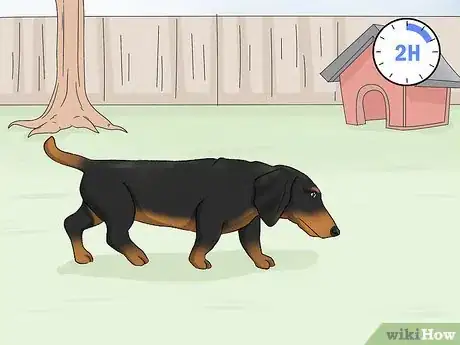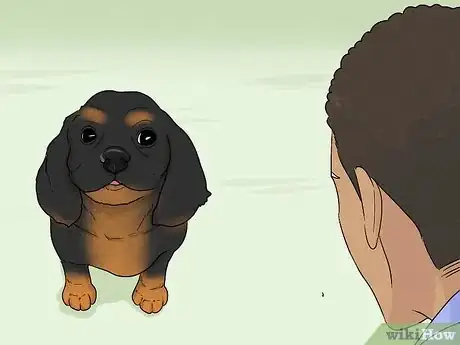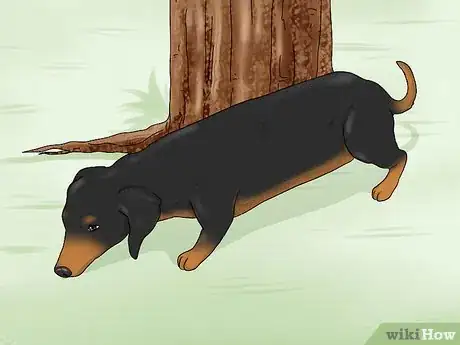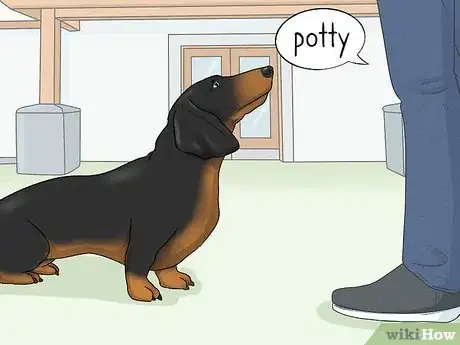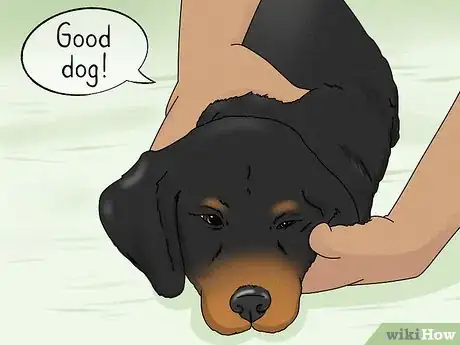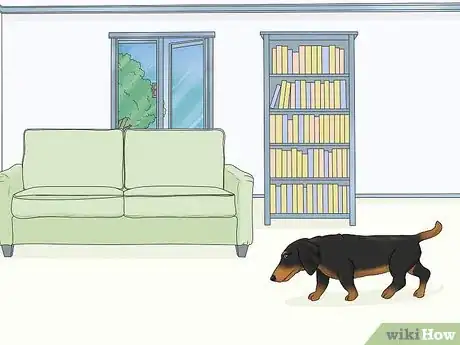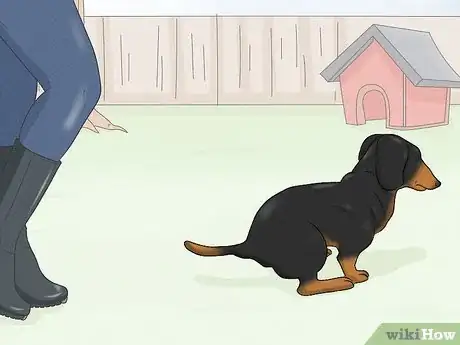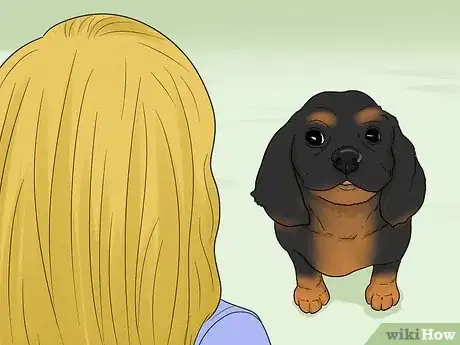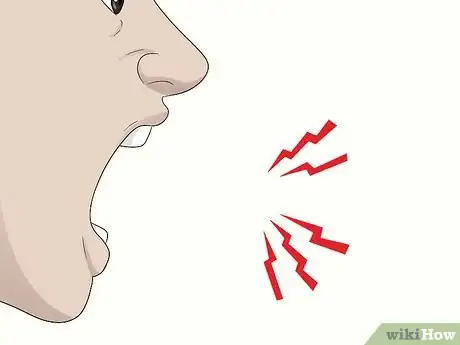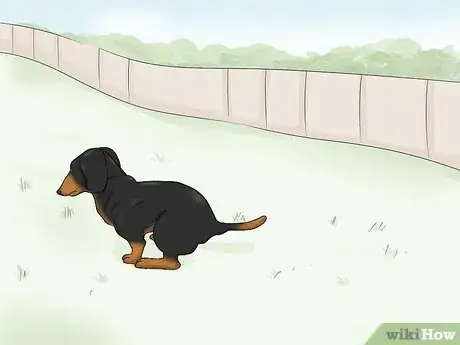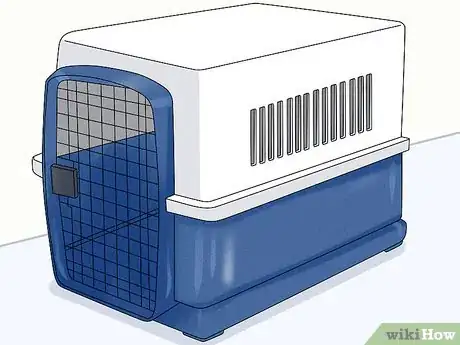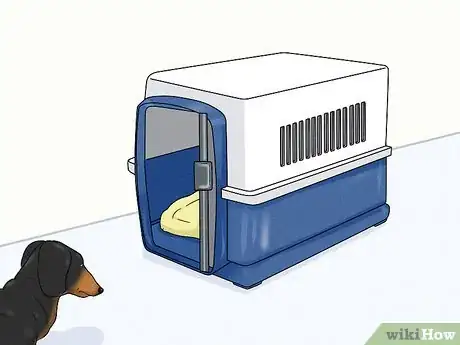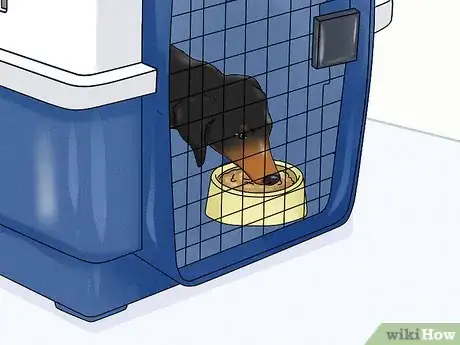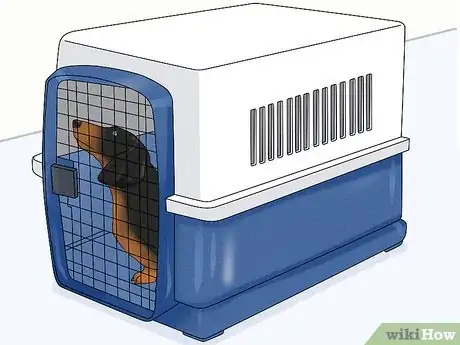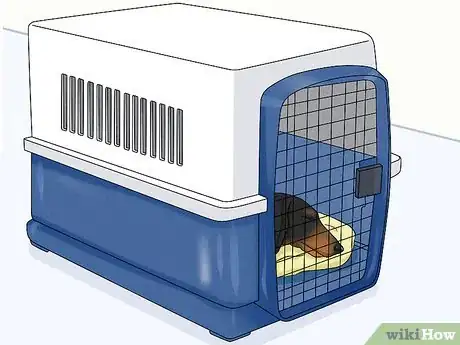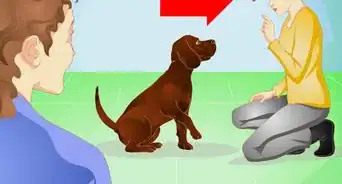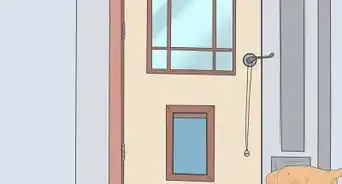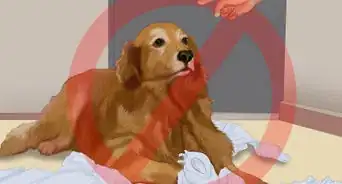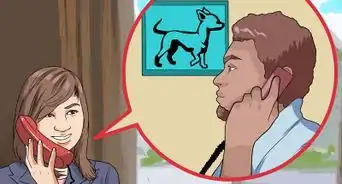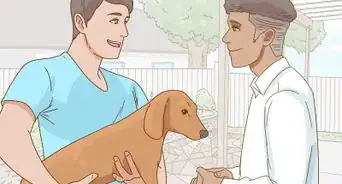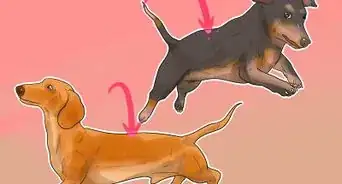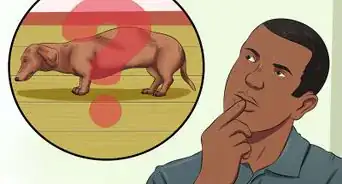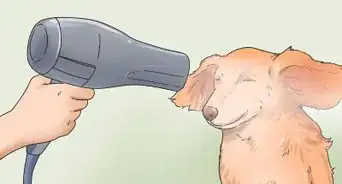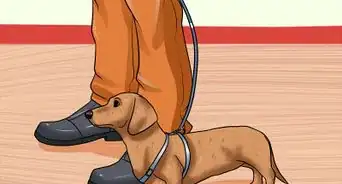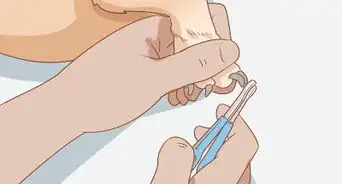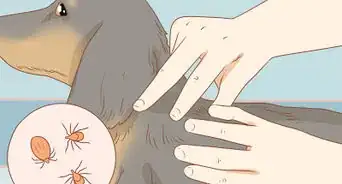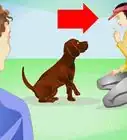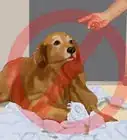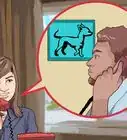This article was co-authored by David Levin and by wikiHow staff writer, Hunter Rising. David Levin is the Owner of Citizen Hound, a professional dog walking business based in the San Francisco Bay Area. With over 9 years of professional dog walking and training experience, David's business has been voted the "Best Dog Walker SF" by Beast of the Bay for 2019, 2018, and 2017. Citizen Hound has also been ranked #1 Dog Walker by the SF Examiner and A-List in 2017, 2016, 2015. Citizen Hound prides themselves on their customer service, care, skill, and reputation.
There are 16 references cited in this article, which can be found at the bottom of the page.
wikiHow marks an article as reader-approved once it receives enough positive feedback. In this case, 85% of readers who voted found the article helpful, earning it our reader-approved status.
This article has been viewed 178,679 times.
Dachshunds, or doxies, are intelligent but notoriously stubborn, so training yours to go potty outside may feel like a bit of a challenge.[1] While it’s easy to get frustrated after your dog has an accident, it’s still learning and doesn’t understand that going potty inside your home is wrong. While you can’t prevent every accident, properly house-breaking your doxie makes it less likely you’ll come home to an unwelcome mess. Puppies and adults can both be trained, so you can work with your dog no matter how old it is. Even though you may have to clean up after your dog every now and then, you’ll be able to train your doxie as long as you’re patient and consistent!
Steps
Taking Your Dachshund Outside
-
1Let your dachshund out every 2 hours during the day. Even though you won’t know exactly when your dachshund needs to go potty, it will have predictable times where it has to go out. Immediately after your doxie wakes up, finishes a meal, or has a play session, lead it outside so it has a chance to relieve itself. You should also try taking it outside right before you go to bed for the evening. Even though it may seem tedious, you should aim to let your dog out at least once every 2 hours.[2]
- Dogs can usually hold their bladder for a number of hours equal to your dog’s age in months. So if you have a 4-month old dachshund, you should be okay leaving it inside for up to 4 hours.[3]
-
2Check if your doxie is whimpering, walking in circles, or whining. Even though you’re letting your dachshund out every few hours, you may notice some other signals that mean you should let it outside sooner. If your dog circles around on the floor, has stiff back legs, or starts whining, let it out to go potty as soon as you can so you don’t need to clean up an accident.[4]
- Your doxie may try to sneak off to go potty in different room, so keep your eyes on it during the day. If you’re really worried about your doxie going on your floors, try to keep it confined to 1 or 2 rooms.
Advertisement -
3Lead your dog to a consistent spot outside to go potty. It doesn’t matter if the spot is in your yard or along the path of your regular walk, but be sure you can go there every time your dog needs to go outside. If you can, choose a place that’s quiet and doesn’t have a lot of distractions so your doxie stays focused on training. Keep your dog on a leash so it doesn’t wander away from your designated spot.[5]
- While it may not seem like the most important thing, always take your dog to the same place. Dachshunds learn best from consistency and you may confuse them if you lead them to a different potty spot.[6]
-
4Say a potty command to encourage your doxie to go. Your doxie has a powerful sense of smell, so it may spend a little time sniffing around and exploring before it goes to the bathroom. This is completely normal, so stay patient and let your dog take its time.[7] To encourage your doxie to go, say something like “potty” or “go” so your dog learns what it’s supposed to do.[8]
- While it can be tempting, don’t play with your dog when you take it out, or else it won’t know if it’s potty or play time.
-
5Praise and reward your dog after it eliminates. Once your doxie finally does its business, it’s time to celebrate. Pet your pup and speak in a happy tone to let it know it’s done a good job. You can even give your dog a small treat or piece of food as a reward so it makes a positive association with going outside.[9]
- For example, you could say something like "Good dog!" in a happy, encouraging tone while your dog relieves itself and follow up by giving it a treat.
-
6Bring your doxie back inside for 10–15 minutes if it doesn’t go potty. It can feel like a waste of time when your dog acts stubborn and refuses to go potty. Rather than getting mad or staying outside, keep your doxie attached to its leash and bring it back indoors. After about 10–15 minutes, lead it back outside and try saying your command again.[10] If your doxie finally goes potty, give it praise as you normally would so it stays encouraged.
- Keep bringing your dog back in for 10-minute intervals if it still refuses to go.
Catching and Cleaning Accidents
-
1Supervise your doxie while you’re potty-training it. Finding an accident on your floor gets really frustrating, so keep your doxie within sight when you’re training. If you’re worried about it wandering into a different room, confine your dog with you or keep it attached to a leash in your pocket. That way, you can easily address your dog as soon as it needs to go outside or has an accident.[11]
- An accident is much easier to clean off of hard floors, so you may want to keep your doxie in a mudroom or kitchen while you’re training.
-
2Watch your doxie for bathroom signs like whimpering, sniffing, or circling. While you can’t predict exactly when your dog needs to go outside, you can still look for some common signals. If you notice that your dog is whining for no apparent reason, sniffing the ground, circling around the same spot, or walking with stiff legs, take it outside as soon as you can so you don’t have to deal with a mess.[12]
-
3Interrupt your dog with a loud noise if you catch it going potty inside.[13] Even if your dog starts going potty inside, you might be able to interrupt it so you don’t have to clean up as much. Stop your doxie as soon as you can so it learns that it’s behaving badly.[14] Clap loudly or say a “no” in a firm, yet calm voice to startle your dog so it pauses.
- You don’t want to scare your dog, or else it may try to hide when it needs to go potty. Avoid yelling at or punishing your doxie if it has an accident.[15]
-
4Take your dachshund outside immediately. As soon as you interrupt it, pick up your doxie or lead it outside to its normal potty spot. If it doesn’t want to finish right away, be patient and wait for a few minutes with it. You can try using the potty command you decided on to encourage it to start going again. Once your doxie is done, praise your dog for finishing outside so it learns that inside is off-limits.[16]
- Even though your doxie had an accident and you may feel frustrated, be loving and affectionate toward it when it finishes outside to stay consistent with training.
-
5Clean the spot with an enzymatic cleaner to break down the odor. If your doxie smells any urine or feces inside, it may think that it’s okay to continue eliminating there. Try to soak up as much as you can with a paper towel before spraying it with your enzymatic cleaner. Let the cleaner soak into the area to get rid of the odor completely.[17]
- You can buy enzymatic cleaner online or from your local pet supply store.
Crate Training Your Doxie
-
1Get a crate just large enough for your dog to turn around and lie in. Your dog treats its crate like a den where it sleeps and feels safe.[18] Visit your local pet supply store and find a crate that’s the right size for your dog. Make sure the crate has enough space for your dog to stand up and turn around so it doesn’t feel too restricted or uncomfortable.[19]
- Avoid getting a crate that’s any larger than you need since your doxie may have enough room to lie down on one end and go potty on the other.
- If you can’t find a crate that’s the right size, then you may need to block off sections inside the crate to make it smaller.
-
2Keep the crate open so your doxie gets comfortable around it. A new crate can be intimidating to your doxie when you first bring it home. Set the crate in a room where you spend most of your time with your dog and open the door completely. Let your doxie walk around the room and find the crate on its own so it gets used to it being around. If your doxie acts hesitant or scared of the crate, don’t worry––just put some toys or its favorite treats inside to encourage it to explore inside.[20]
- It may also help to put a towel or blanket on the bottom of the crate to make it more comfortable.[21]
- Never force your dog inside or use the crate as a punishment, or else your doxie will make negative associations with it.
-
3Feed your dog meals inside the crate. Once your dog enters and exits the crate on its own, start putting its food bowl toward the back of the crate for each meal. Wait for your doxie to get into the crate and close the door slowly once it starts eating. Don’t try to make a big deal out of it since you could startle your dog. As it finishes its meal, immediately open the door and praise your doxie. At the next meal, leave the door closed for a few minutes longer after your doxie finishes eating. Work your dachshund up to staying in the crate for 10 minutes after mealtime, and make sure you give it a lot of praise for being good.[22]
- Stay in the room while you crate your doxie so it doesn’t feel alone.
- If your dachshund starts whining, you may have tried increasing the time too quickly. Don’t let you doxie out right away, or else it will think whining will work every time. Instead, shorten how long you keep it in the crate during the next mealtime.
-
4Leave your doxie in the crate for increasing amounts of time. If your doxie doesn’t get anxious when it eats in the crate, you might be ready to use the crate without food as a distraction. Encourage your dog into the crate with a treat before shutting the door. Sit in the same room as your dog for about 5–10 minutes so it doesn’t get lonely or feel uncomfortable. Then go into a different room and wait for a few minutes. Come back to the crate and wait for another minute or so before letting your doxie out. Try this a few times during the day, increasing the length of time you’re gone each time until you reach 30 minutes.[23]
- Avoid leaving your doxie crated for more than 4 hours during the day.[24]
- If your dog whines, it can be tempting to let it out right away, but wait until it’s quiet first. Otherwise, it will associate whining with you opening the door and continue acting that way.
-
5Put your doxie in its crate overnight so you can hear if it needs to go out. It’s normal to worry about what your dog gets into overnight, so you may want to keep it in the crate instead. Bring its crate into your bedroom so your doxie doesn’t feel separated from you throughout the night. If your dachshund starts whining or crying, don’t get frustrated by it waking you up. Instead, take a few seconds to talk to your dog so it calms down. If you’re training a puppy, you’ll also be able to hear when your dachshund needs to go outside so you can let it out.[25]
- If you don’t want your dachshund sleeping in your room at night, move the crate further from your bed each night.
Expert Q&A
-
QuestionHow do I stop my dachshund from peeing in the house?
 David LevinDavid Levin is the Owner of Citizen Hound, a professional dog walking business based in the San Francisco Bay Area. With over 9 years of professional dog walking and training experience, David's business has been voted the "Best Dog Walker SF" by Beast of the Bay for 2019, 2018, and 2017. Citizen Hound has also been ranked #1 Dog Walker by the SF Examiner and A-List in 2017, 2016, 2015. Citizen Hound prides themselves on their customer service, care, skill, and reputation.
David LevinDavid Levin is the Owner of Citizen Hound, a professional dog walking business based in the San Francisco Bay Area. With over 9 years of professional dog walking and training experience, David's business has been voted the "Best Dog Walker SF" by Beast of the Bay for 2019, 2018, and 2017. Citizen Hound has also been ranked #1 Dog Walker by the SF Examiner and A-List in 2017, 2016, 2015. Citizen Hound prides themselves on their customer service, care, skill, and reputation.
Professional Dog Trainer If you see your dog having an accident, try to interrupt them as soon as you can to discourage them from doing it again. Try to take them outside right away and give them praise or a treat to positively reinforce them.
If you see your dog having an accident, try to interrupt them as soon as you can to discourage them from doing it again. Try to take them outside right away and give them praise or a treat to positively reinforce them. -
QuestionMy dachshund pup toilets all over inside, even if he's just comes inside from the garden. What can I do?
 Pippa Elliott, MRCVSDr. Elliott, BVMS, MRCVS is a veterinarian with over 30 years of experience in veterinary surgery and companion animal practice. She graduated from the University of Glasgow in 1987 with a degree in veterinary medicine and surgery. She has worked at the same animal clinic in her hometown for over 20 years.
Pippa Elliott, MRCVSDr. Elliott, BVMS, MRCVS is a veterinarian with over 30 years of experience in veterinary surgery and companion animal practice. She graduated from the University of Glasgow in 1987 with a degree in veterinary medicine and surgery. She has worked at the same animal clinic in her hometown for over 20 years.
Veterinarian A puppy has a lot to learn, so be patient. Supervise him constantly indoors, even if this means having him on a leash so you can watch for signs of squatting. When you can't be there, pop him in his crate. Take him outside every 20 minutes, whether you think he needs to go or not. Stay outside with him for 10 minutes, so as to increase the chance of him going — and then praise him like mad when he does. If he still doesn't go, return indoors, but either crate him until the next toilet break, or take him outside every five minutes! Training is about decreasing the opportunity indoors, and increasing the opportunity outdoors.
A puppy has a lot to learn, so be patient. Supervise him constantly indoors, even if this means having him on a leash so you can watch for signs of squatting. When you can't be there, pop him in his crate. Take him outside every 20 minutes, whether you think he needs to go or not. Stay outside with him for 10 minutes, so as to increase the chance of him going — and then praise him like mad when he does. If he still doesn't go, return indoors, but either crate him until the next toilet break, or take him outside every five minutes! Training is about decreasing the opportunity indoors, and increasing the opportunity outdoors. -
QuestionCan you house train a Dachshund?
 Pippa Elliott, MRCVSDr. Elliott, BVMS, MRCVS is a veterinarian with over 30 years of experience in veterinary surgery and companion animal practice. She graduated from the University of Glasgow in 1987 with a degree in veterinary medicine and surgery. She has worked at the same animal clinic in her hometown for over 20 years.
Pippa Elliott, MRCVSDr. Elliott, BVMS, MRCVS is a veterinarian with over 30 years of experience in veterinary surgery and companion animal practice. She graduated from the University of Glasgow in 1987 with a degree in veterinary medicine and surgery. She has worked at the same animal clinic in her hometown for over 20 years.
Veterinarian Absolutely, Dachshunds are highly intelligent and willing to learn. The question is not whether a Dachshund can be house trained but whether the owner has sufficient knowledge to teach the dog.
Absolutely, Dachshunds are highly intelligent and willing to learn. The question is not whether a Dachshund can be house trained but whether the owner has sufficient knowledge to teach the dog.
Warnings
- Never punish your dachshund if it has an accident since it will not learn from its mistakes and may become afraid of you.[27]⧼thumbs_response⧽
- If your dachshund suddenly starts having accidents in your home, schedule an appointment with a veterinarian to make sure it doesn’t have any health issues.[28]⧼thumbs_response⧽
Things You’ll Need
Taking Your Dachshund Outside
- Leash
- Treats
Catching and Cleaning Accidents
- Leash
- Enzymatic cleaner
Crate Training Your Doxie
- Dog crate
- Treats
- Dog food
- Food bowls
References
- ↑ https://www.akc.org/dog-breeds/dachshund/
- ↑ https://www.humanesociety.org/resources/how-housetrain-your-dog-or-puppy
- ↑ David Levin. Professional Dog Walker & Trainer. Expert Interview. 19 December 2019.
- ↑ https://www.aspca.org/news/house-training-your-dog-or-puppy
- ↑ https://www.humanesociety.org/resources/how-housetrain-your-dog-or-puppy
- ↑ https://www.akc.org/dog-breeds/dachshund/
- ↑ https://www.akc.org/dog-breeds/dachshund/
- ↑ https://resources.bestfriends.org/article/housetraining-dog
- ↑ https://www.aspca.org/news/house-training-your-dog-or-puppy
- ↑ http://americanhumane.org/fact-sheet/housetraining-puppies-dogs/
- ↑ https://www.humanesociety.org/resources/how-housetrain-your-dog-or-puppy
- ↑ https://www.aspca.org/news/house-training-your-dog-or-puppy
- ↑ David Levin. Professional Dog Walker & Trainer. Expert Interview. 19 December 2019.
- ↑ https://www.paws.org/resources/re-housetraining-your-adult-dog/
- ↑ David Levin. Professional Dog Walker & Trainer. Expert Interview. 19 December 2019.
- ↑ https://www.animalhumanesociety.org/behavior/housetraining-survival-guide
- ↑ https://resources.bestfriends.org/article/housetraining-dog
- ↑ David Levin. Professional Dog Walker & Trainer. Expert Interview. 19 December 2019.
- ↑ https://www.paws.org/resources/how-to-crate-train-your-dog/
- ↑ https://www.dachshundhealth.org.uk/crate-training
- ↑ https://www.animalhumanesociety.org/behavior/crate-training-your-dog-or-puppy
- ↑ https://www.paws.org/resources/how-to-crate-train-your-dog/
- ↑ https://www.paws.org/resources/how-to-crate-train-your-dog/
- ↑ https://resources.bestfriends.org/article/crate-training-dog-dog-training-plan
- ↑ https://www.dachshundhealth.org.uk/crate-training
- ↑ https://www.akc.org/dog-breeds/dachshund/
- ↑ https://www.aspca.org/news/house-training-your-dog-or-puppy
- ↑ http://americanhumane.org/fact-sheet/housetraining-puppies-dogs/
About This Article
If you need to potty train a dachshund, watch it for signs that it needs to use the bathroom, like suddenly getting excited or racing around the house. Try to take an adult dog outside every 1-2 hours, and take puppies out as often as every 20 minutes. When you’re taking the dachshund outside, and when it uses the bathroom, use a command like “Go potty!” so it will start to associate the phrase with potty training. Give the dog plenty of praise when it goes in the right spot. If it has an accident, clean it up right away; otherwise, the smell could encourage it to go in that spot again. Keep reading for tips from our veterinary co-author on what to do if you catch your dog having an accident!
